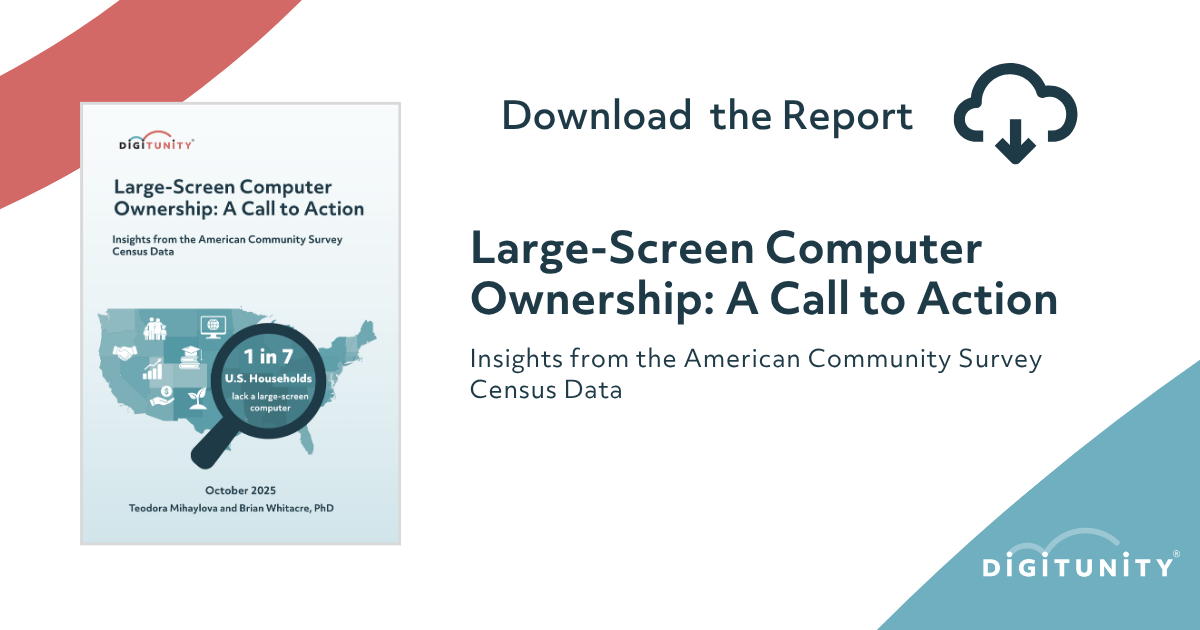A Digitunity analysis of previously unpublished Census data reveals persistent disparities in computer ownership across age, race, ethnicity, education, and employment status and the gap continues to impact the ability to participate in today's digital world.
CONWAY, NEW HAMPSHIRE / ACCESS Newswire / October 15, 2025 / Digitunity releases "Large-Screen Computer Ownership: A Call to Action," an extensive analysis of previously unpublished, demographic-specific data from the U.S. Census Bureau's 2023 American Community Survey (ACS). The report reveals that more than 33 million people in the United States either lack a computing device or rely exclusively on a smartphone for internet access.
"This report is the first attempt I'm aware of to explore the lack of large-screen computer ownership across demographic characteristics. This level of detail is important for designing policies and programs that effectively reach the people who need them the most," said Brian Whitacre, Ph.D., Professor and Jean & Patsy Neustadt Chair, Department of Agricultural Economics at Oklahoma State University and report co-author.
Even with progress in broadband expansion, one in seven U.S. households still lacks access to a large-screen computer, a vital tool for education, employment, healthcare, and civic engagement. This new analysis uncovers stark disparities:
Older adults are five times more likely than working-age adults to lack any type of computer. One in ten older adults relies exclusively on a smartphone to get online.
About one in three adults without a high school diploma do not have access to a large-screen computer at home. One in five adults without a high school diploma relies solely on a smartphone to go online.
One in four residents who identify as some other race and approximately one in six African American, American Indian/Alaska Native, and Native Hawaiian/Other Pacific Islander residents, do not have a large-screen computer at home and rely exclusively on a smartphone to go online. That compares with 5.5% of Asian Americans and 8.5% of white residents.
People outside the labor force are more than four times as likely to be without a computer compared to those who are employed.
A household in Mississippi is three times more likely to lack a large-screen computer than a household in Utah.
By examining this level of demographic detail, we move beyond averages to see who is most affected by the lack of computer ownership and where progress is being made. Ensuring everyone who needs a computer has one is achievable but it requires treating computer ownership as a shared responsibility and mobilizing government, philanthropy, business, and community organizations to close the gap.
The data shows a clear link between income and computer access: households with lower incomes are far more likely to rely only on smartphones. These results suggest that affordability is a central barrier to computer access. Digitunity advocates for broader, coordinated solutions to increase computer ownership, including the development of sustainable computer ecosystems at the local, state, and national levels
Download the report here.
About Digitunity
Digitunity is a national nonprofit dedicated to expanding computer ownership and advancing digital equity, ensuring that everyone who needs a computer has one. For nearly 40 years, Digitunity has been promoting technology reuse and fostering community-driven deployment networks to reach underserved populations. Through a robust national network of practitioners and partnerships, Digitunity generates and distributes donated computers to organizations serving individuals in need and provides expert guidance to states, cities, and coalitions on strategies to address the ongoing computer needs of communities affected by the digital divide. Learn more at Digitunity.org.
Contact Information
Buse Kayar
Media Contact
busek@accessnewswire.com
SOURCE: Digitunity
Related Images

View the original press release on ACCESS Newswire:
https://www.accessnewswire.com/newsroom/en/computers-technology-and-internet/digitunity-releases-new-report-that-finds-33-million-people-in-th-1085576
